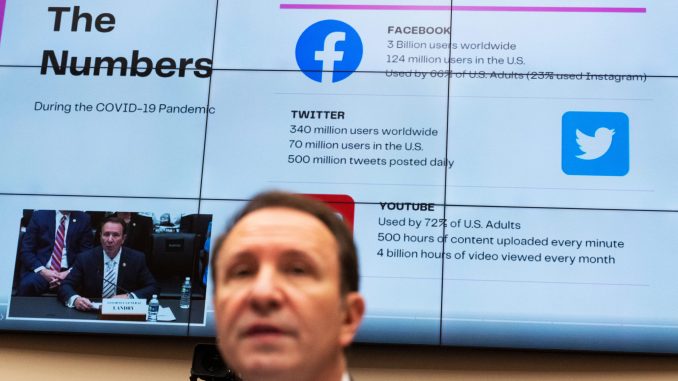
Twenty-two states, along with the District of Columbia, are urging the Supreme Court to back the Biden administration’s coordination with Big Tech to censor speech online.
In a brief, the states wrote that the 5th Circuit Court of Appeals made a mistake in finding the federal government’s likely “coerced or significantly encouraged” content moderation in violation of the First Amendment. In blocking the government from engaging in these activities, the states argue, the court “significantly restricted the federal government’s essential role in participating in the marketplace of ideas.”
“This will impoverish, rather than protect, robust debate on matters of vital public importance,” the states argue.
The 22 states are Arizona, California, Colorado, Connecticut, Delaware, Hawaii, Illinois, Maine, Maryland, Massachusetts, Michigan, Minnesota, Nevada, New Jersey, New Mexico, New York, Oregon, Pennsylvania, Rhode Island, Vermont, Washington, and Wisconsin, along with the District of Columbia.
The secretaries of state in eight states—Arizona, Colorado, Connecticut, Maine, Minnesota, New Mexico, Oregon and Vermont—also filed their own brief urging the Supreme Court to reverse the 5th Circuit’s ruling.
They worry that officials’ communications with platforms during the 2020 and 2022 election season have “essentially ended” ahead of “a critical and hotly contested 2024 election season,” which increases the risk that “dangerous, and even illegal, falsehoods about elections and voting will spread unchecked.”
“The First Amendment does not require states to sit idly by while false information about their work or the laws in their states spreads online,” the officials wrote. “To the contrary: to combat the explosion of false information about elections, officials like those in the office of amici here, and other states, made investments in combating this false information.”
They argue government agencies can “attempt to correct false speech,” adding that the “most effective way to do that is to stop it from spreading.”
Democratic Colorado Secretary of State Jena Griswold, who signed onto the brief, has also backed the Colorado Supreme Court’s decision to kick former President Donald Trump off the state’s presidential primary ballot. Likewise, Democratic Maine Secretary of State Shenna Bellows ruled Dec. 28 that Trump was ineligible to appear on the state’s ballot, prompting him to appeal in state court on Tuesday.
New York Attorney General Letitia James is leading the 22 states’ brief.
A number of the states that signed on to the briefs have also recently had laws regulating speech struck down in court as violations of the First Amendment.
A federal judge blocked enforcement last year of New York’s online hate-speech law, which required social media companies to “maintain mechanisms for reporting hateful conduct” on their platforms. The 2nd Circuit will hear oral arguments for New York’s appeal of the ruling early this year.
Last year, a judge also blocked California’s law that allowed disciplinary action against doctors who shared COVID-19 “misinformation,” which the state later repealed.
The Supreme Court also ruled last year that Colorado’s Anti-Discrimination Act (CADA) cannot compel Christian web designer Lorie Smith to create custom wedding websites for same-sex couples in violation of her religious beliefs.
U.S. District Court Judge Terry Doughty initially issued an injunction blocking the Biden administration from communicating with social media companies to censor speech, finding the Republican attorneys general of Louisiana and Missouri had “produced evidence of a massive effort by Defendants, from the White House to federal agencies, to suppress speech based on its content.” Doughty called the government’s censorship activities “Orwellian.”
Internal government documents brought to light through the attorney generals’ lawsuit revealed numerous instances of censorship, including the Cybersecurity and Infrastructure Security Agency (CISA) facilitating “switchboards” that allowed state and local election officials to flag misinformation for removal during the 2020 election.
Originally published by the Daily Caller News Foundation
Have an opinion about this article? To sound off, please email letters@DailySignal.com, and we’ll consider publishing your edited remarks in our regular “We Hear You” feature. Remember to include the URL or headline of the article plus your name and town and/or state.
